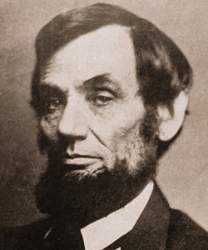Record Data
Source citation
Abraham Lincoln, Speech at Great Central Sanitary Fair, Philadelphia, Pennsylvania, June 16, 1864 in Roy P. Basler, ed., The Collected Works of Abraham Lincoln (8 vols., New Brunswick, NJ: Rutgers University Press, 1953), 7: 395-397, http://quod.lib.umich.edu/l/lincoln/.
Type
Speech
Date Certainty
Exact
Transcriber
Transcription adapted from The Collected Works of Abraham Lincoln (1953), edited by Roy P. Basler
Adapted by Matthew Pinsker, Dickinson College
Transcription date
Transcription
The following text is presented here in complete form, as it originally appeared in print. Spelling and typographical errors have been preserved as in the original.
June 16, 1864
I suppose that this toast was intended to open the way for me to say something. [Laughter.] War, at the best, is terrible, and this war of ours, in its magnitude and in its duration, is one of the most terrible. It has deranged business, totally in many localities, and partially in all localities. It has destroyed property, and ruined homes; it has produced a national debt and taxation unprecedented, at least in this country. It has carried mourning to almost every home, until it can almost be said that the ``heavens are hung in black.'' Yet it continues, and several relieving coincidents [coincidences] have accompanied it from the very beginning, which have not been known, as I understood [understand], or have any knowledge of, in any former wars in the history of the world. The Sanitary Commission, with all its benevolent labors, the Christian commission, with all its Christian and benevolent labors, and the various places, arrangements, so to speak, and institutions, have contributed to the comfort and relief of the soldiers. You have two of these places in this city---the Cooper-Shop and Union Volunteer Refreshment Saloons. [Great applause and cheers.] And lastly, these fairs, which, I believe, began only in last August, if I mistake not, in Chicago; then at Boston, at Cincinnati, Brooklyn, New York, at Baltimore, and those at present held at St. Louis, Pittsburg, and Philadelphia. The motive and object that lie at the bottom of all these are most worthy; for, say what you will, after all the most is due to the soldier, who takes his life in his hands and goes to fight the battles of his country. [Cheers.] In what is contributed to his comfort when he passes to and fro [from city to city], and in what is contributed to him when he is sick and wounded, in whatever shape it comes, whether from the fair and tender hand of woman, or from any other source, is much, very much; but, I think there is still that which has as much value to him [in the continual reminders he sees in the newspapers, that while he is absent he is yet remembered by the loved ones at home---he is not forgotten. [Cheers.] Another view of these various institutions is worthy of consideration, I think; they are voluntary contributions, given freely, zealously, and earnestly, on top of all the disturbances of business, [of all the disorders,] the taxation and burdens that the war has imposed upon us, giving proof that the national resources are not at all exhausted, [cheers;] that the national spirit of patriotism is even [firmer and] stronger than at the commencement of the rebellion [war].
It is a pertinent question often asked in the mind privately, and from one to the other, when is the war to end? Surely I feel as deep [great] an interest in this question as any other can, but I do not wish to name a day, or month, or a year when it is to end. I do not wish to run any risk of seeing the time come, without our being ready for the end, and for fear of disappointment, because the time had come and not the end. [We accepted this war; we did not begin it.] We accepted this war for an object, a worthy object, and the war will end when that object is attained. Under God, I hope it never will until that time. [Great cheering.] Speaking of the present campaign, General Grant is reported to have said, I am going through on this line if it takes all summer. [Cheers.] This war has taken three years; it was begun or accepted upon the line of restoring the national authority over the whole national domain, and for the American people, as far as my knowledge enables me to speak, I say we are going through on this line if it takes three years more. [Cheers.] My friends, I did not know but that I might be called upon to say a few words before I got away from here, but I did not know it was coming just here. [Laughter.] I have never been in the habit of making predictions in regard to the war, but I am almost tempted to make one. [(Do it---do it!)]---If I were to hazard it, it is this: That Grant is this evening, with General Meade and General Hancock, of Pennsylvania, and the brave officers and soldiers with him, in a position from whence he will never be dislodged until Richmond is taken [loud cheering], and I have but one single proposition to put now, and, perhaps, I can best put it in form of an interrogative [interragatory]. If I shall discover that General Grant and the noble officers and men under him can be greatly facilitated in their work by a sudden pouring forward [forth] of men and assistance, will you give them to me? [Cries of ``yes.''] Then, I say, stand ready, for I am watching for the chance. [Laughter and cheers.] I thank you, gentlemen.





